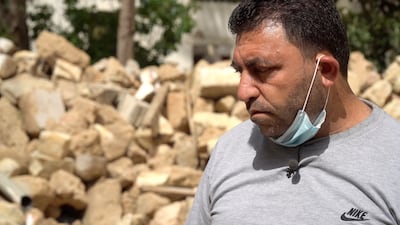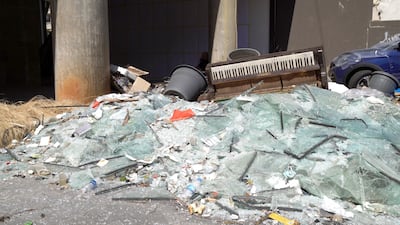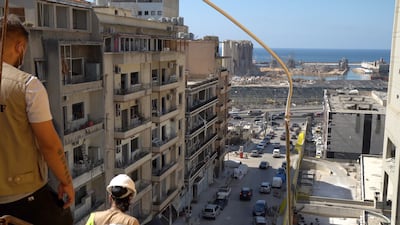As he shaves a customer's head, razor and comb in hand, Antoine Akoury describes in detail the moments after the deadly Beirut blast on August 4, 2020.
“I thought it was an exploded gas canister, a car bomb or clashes between Israel and Hezbollah,” he says.
The barber, 57, is one of the characters in The Sound of Broken Glass, a new documentary by Dutch filmmaker Marcel van der Steen about life in Beirut after the tragic explosion. Its first screening will be held at the Kino cinema in Rotterdam, the Netherlands, on Wednesday.
A former Beirut correspondent for Dutch broadcaster Nos, van der Steen returned to the city days after the explosion to document the damage and subsequent aid relief for a co-operation of Dutch non-governmental organisations.
“I wasn’t sad when I left Beirut in 2019. It was a hard city for me to live in,” he tells The National, “But when I came back after the blast, it broke my heart. I realised how much I loved the city.”
Van der Steen's experience in the Balkans and the Middle East led him to pursue a longer, slower form of storytelling.
“With news, the whole world watches for a few days and moves on. I knew that a week after the blast, all the cameras would be gone,” he says. “But what happens to people afterwards is much more important."
Indeed, in the months after the event, Lebanon was plunged into a deep economic and political crisis. A year on, its citizens face soaring food prices, severe fuel and medical shortages, and the mass migration of the country’s professional sector.
“This story and its people deserve much more than a two-minute report,” van der Steen says.
The absence of a functional state is clear from the onset of the film, with footage of young volunteers clearing debris and rubble after the blast.
“There is no public sector [to support us]. Other than being incredibly corrupt, they are incompetent and they don’t care,” says volunteer Omar Itani, 26, who appears in the documentary.
Alongside Itani and Akoury features Ahmed, a Syrian migrant living in Karantina, an industrial area and one of the neighbourhoods heavily damaged by the blast. His wife and two daughters were killed and his third daughter was severely injured. In what is left of his bare home, he shows van der Steen a large pile of shoes in the corner.
“Those were their shoes,” he says, “It’s all I have left.”

The film pays particular attention to Beirut’s creative middle class as they are catapulted into unexpected fates, whether plunging into poverty or pledging themselves to social activism.
“I wanted to show that Beirut’s middle class is struggling as much as everyone else,” says van der Steen. “When I lived in Beirut, I was part of this young, creative community living in Gemmayze and Mar Mikhael. But that bubble has exploded as well.”
Itani has been thrown off his career path and now supports struggling families. “If you asked me two or three months ago, 'would you ever see yourself distributing food or hygiene kits', I would have told you never,” he says in the film.
Today, he manages FabricAid, a social enterprise that buys and sells second-hand clothing, a concept once alien to Lebanese society. “People would just donate their clothes [because they didn’t] need the extra money ... All of this changed.”
In one of the documentary's particularly poignant moments, Rana Al-Dirani, 39, founder of a successful language school in Beirut, cooks for her two sons while giving Arabic lessons over a video call.
Of the meal she has prepared, she tells van der Steen: “We used to stuff [kibbeh] with pine nuts. But now we can’t afford pine nuts.”
Olive oil, she adds, has also become too expensive.

Beirut’s current crisis is so rapidly evolving that the filmmaker, who spent almost a year with the documentary's subjects, is unable to keep up. In the film, van der Steen accompanies creative director Melanie Dagher, 31, on her first trip back to her flat in a heavily destroyed area, 10 months after the blast.
“It’s like it used to be,” she says with a sigh of relief, about the lively street and open shops. But only weeks after the scene was filmed, the plummeting lira and severe fuel and electricity shortages have deadened the area.
Van der Steen focuses on the personal lives of his subjects, rather than the political events that ensued after the blast, such as regular union strikes and targeted assassinations. The decision to omit these details, he explains, was deliberate.
“Although it’s a film about Lebanon, I want audiences in the Netherlands to recognise themselves because these are people struggling with their daily lives,” he says.
He was even hesitant to include footage of the blast, which appears as a single scene at the start of the film.
His subjects are equally mute about their political opinions, with the exception of barber Akoury. “What a government. This is a Syrian government. An Iranian government. A socialist government,” he says, while trimming a client’s hair.“We want Europe. We want America."
Van der Steen worries that the spirit of Beirut is fading. He draws parallels to his native Rotterdam, a city destroyed by German bombing during the Second World War, and since revived as a trading, tech and creative hub.
“It took 60 years to give back soul to my home town,” he says.
These concerns are echoed by Dagher in the film. “We used to talk about Beirut like, ‘it's amazing, the parties, the food.’ But now I’m worried to talk about Lebanon. Everything ... about it before is not there any more."


